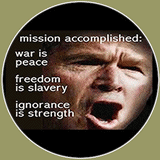
Admit Errors
By PAUL KRUGMAN
Many people are perplexed by the uproar over Senator Hillary Clinton’s refusal to say, as former Senator John Edwards has, that she was wrong to vote for the Iraq war resolution. Why is it so important to admit past error? And yes, it was an error — she may not have intended to cast a vote for war, but the fact is the resolution did lead to war; she may not have believed that President Bush would abuse the power he was granted, but the fact is he did.
The answer can be summed up in two words: heckuva job. Or, if you want a longer version: Medals of Freedom to George Tenet, who said Saddam had W.M.D., Tommy Franks, who failed to secure Iraq, and Paul Bremer, who botched the occupation.
For the last six years we have been ruled by men who are pathologically incapable of owning up to mistakes. And this pathology has had real, disastrous consequences. The situation in Iraq might not be quite so dire — and we might even have succeeded in stabilizing Afghanistan — if Mr. Bush or Vice President Dick Cheney had been willing to admit early on that things weren’t going well or that their handpicked appointees weren’t the right people for the job.
The experience of Bush-style governance, together with revulsion at the way Karl Rove turned refusal to admit error into a political principle, is the main reason those now-famous three words from Mr. Edwards — “I was wrong” — matter so much to the Democratic base.
The base is remarkably forgiving toward Democrats who supported the war. But the base and, I believe, the country want someone in the White House who doesn’t sound like another George Bush. That is, they want someone who doesn’t suffer from an infallibility complex, who can admit mistakes and learn from them.
And there’s another reason the admission by Mr. Edwards that he was wrong is important. If we want to avoid future quagmires, we need a president who is willing to fight the inside-the-Beltway conventional wisdom on foreign policy, which still — in spite of all that has happened — equates hawkishness with seriousness about national security, and treats those who got Iraq right as somehow unsound. By admitting his own error, Mr. Edwards makes it more credible that he would listen to a wider range of views.
Read the full column
Paul Krugman Politics News Hillary Clinton John Edwards McCain 2008 Iraq Bush War